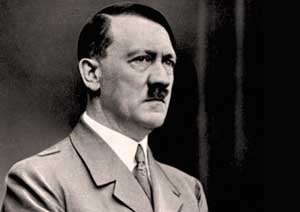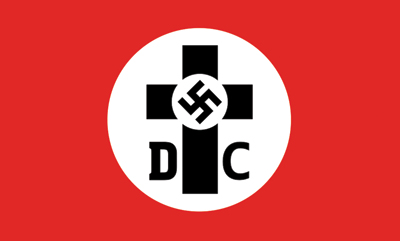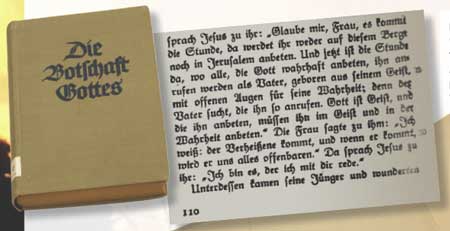Did Hitler rewrite the Bible?

So what are the facts? This article is based on the book The Aryan Jesus: Christian Theologians and the Bible in Nazi Germany by Susannah Heschel,1 Professor of Jewish Studies at Dartmouth College.
Page numbers in brackets in this article refer to her book.
They wanted a faith without anything Jewish in the Bible, and without converted
Jews in the church.
The German Church in the 1930s
In 1930s’ Germany, the ‘German Christians’ (Deutsche Christen) movement arose. These were theologically liberal Protestant churches and theologians who were enthusiastically pro-Nazi, calling Hitler the ‘Führer Jesus’ and ‘God’s agent in our day’ (p. 67). Politically ambitious and anti-Semitic, they wanted a faith without anything Jewish in the Bible, and without converted Jews in the Church. Their ultimate membership of 600,000 constituted about 30 percent of German Protestants (p. 3).In opposition to this, the so-called ‘Confessing Church’ (Bekennende Kirche) movement arose, ultimately attracting some 20 percent of Protestant pastors. It included notable opponents of Hitler such as Karl Barth, Martin Niemöller, and Dietrich Bonhoeffer. However, some of its members were inclined to take other liberties with the plain meaning of the biblical text, and some were even ideologically anti-Semitic, despite wanting to retain Christian Jews in the church.
The Institute

The Deutsche Christen flag
Its founding visionary and Academic Director was Walter Grundmann (1906–76), a member of the Nazi party from 1930. Though Hitler did personally sign the 1938 appointment of Grundmann to Jena University as Professor of New Testament, there is no evidence (despite some sensationalized claims to the contrary) that Hitler ordered the ‘Nazi Bible’ project.
Grundmann was clearly the main instigator of this and the Institute itself, which by 1942 had 180 members—mostly professors of theology, teachers, pastors, bishops, and church superintendents (p. 99). It was not financed by government but by donations from supporting churches, individual church leaders, and sale of its publications (p. 96).
Its goal was to redefine Christianity as a Germanic religion, whose founder, Jesus, was not just a non-Jew, but was an anti-Jew, (a proto-Nazi (p. 71)), who had fought to destroy Judaism, dying as a victim in that struggle. According to Grundmann, the Bible needed to be restored to its pristine condition—purged of its Jewishness which was due to the distortions of history. Protestants had to overcome Judaism, he declared, just as Luther had overcome Catholicism (p. 2) in the Reformation.
Churchgoers were reassured that the Institute was promoting a return to the anti-Jewish Christianity practised in the days of Jesus (p. 116). However, beyond this, the Institute provided a scholarly and religious mantle that gave Nazism religious and moral authority (p. 16). Describing Jesus’ goal as the eradication of Judaism “effectively reframed Nazism as the very fulfillment of Christianity” (p. 17).
The so-called Nazi (or Hitler’s) Bible

CMI’s good friend, information scientist Dr Werner Gitt, author of the new
book Without Excuse, was able to obtain a copy of Die Botschaft Gottes
via the Library of the Technical University of Braunschweig.
- Jesus the Saviour—a life of Jesus based on excerpts from the synoptic Gospels, expunged of OT prophecy fulfillment, and reorganized to present Jesus as a warrior, not a servant or meek or the Lamb of God.
- Jesus the Son of God—a condensed version of the Gospel of John to show the theological significance of Jesus’ actions.
- Jesus the Lord—brief excerpts from various Epistles concerning hope, comfort, community of God, etc.
- The Emergence of the Christian Community—based on Acts, Paul’s Epistles (without his Jewish biography), his mission to the Gentiles, and his break with the Judaizers of Palestine.

Part of John 4 from Die Botschaft Gottes; v. 22 “salvation is from the Jews”
was omitted. In v. 25 “Messiah (called Christ)” was changed to “Promised
one”. Reference to Jesus being “a Jew” in v. 9 was changed to “who
comes from Judea”.
The text associated Jesus with Galilee. Liberal German theologians had taught since the early 1900s that Galilee was supposedly populated by racially Aryan Gentiles in the 8th century BC following the Assyrian conquest of Israel, thereby opposing Jesus’ identity as a Jew (p. 57).
In his own book, Jesus the Galilean, Grundmann advocated that Mary was not a Jew, and Jesus had an illegitimate father: a Roman soldier named Panther (or Panthera) (p. 155). Ironically, this is an ancient libel from Celsus and anti-Christian Jews attacking Jesus’ legitimacy (“ben Panthera/Pandera”). However, the Gospel was clearly presented in Jesus’ discussion with Nicodemus, especially in John 3:16.
By the end of 1941, 200,000 copies of Die Botschaft Gottes had been sold or distributed to members of the German Christians movement, including soldiers (p. 111). Some pastors and scholars in the Confessing Church wrote pamphlets or spoke against it. After the War, most copies were destroyed, with only two or three still known to exist.
A catechism for the times
In 1941, the Institute was involved in producing Germans with God: a German Catechism.5 “It omitted traditional doctrinal positions regarding miracles, virgin birth, incarnation, resurrection, and so forth, in favor of positioning Jesus as a human being who struggled on behalf of God and died not only as a martyr, but also a ‘victor’ on the cross, despite being a victim of the Jews” (pp. 126–27).It (not the ‘Nazi Bible’, as has been reported) contained 12 revised Commandments in place of the OT ten:
- Honor God and believe in him wholeheartedly.
- Seek out the peace of God.
- Avoid all hypocrisy.
- Holy is your health and life.
- Holy is your well-being and honor.
- Holy is your truth and fidelity.
- Honor your father and mother—your children are your aid and your example.
- Keep the blood pure and the marriage holy.
- Maintain and multiply the heritage of your forefathers.
- Be ready to help and forgive.
- Honor your Führer and master.
- Joyously serve the people with work and sacrifice.
The Institute’s perverse attempt to marry Christianity to Nazism was not reciprocated
by the Nazis.
Relationship to the Nazis
The Institute’s perverse attempt to marry Christianity to Nazism was not reciprocated by the Nazis, who were deeply suspicious of all things Christian.6 They tolerated the Institute, but at times even mocked it (p. 148), and kept it under secret surveillance by the intelligence arm of the SS. (p. 149). In March 1943, they confirmed their lack of sympathy for Grundmann by drafting him into military service on the dreaded Eastern (Russian) Front (p. 161).After the war, Grundmann claimed that he was “an objective scholar who had fallen victim to Nazi attacks as a result of his efforts on behalf of Christianity and his scholarship” (p. 253). In the 1950s, he was appointed rector of the Thuringian seminary in Eisenach, in East Germany. From 1956 he served the communists as a spy, supplying information about his opponents in the Confessing Church (p. 256 ff.). He went on to publish various commentaries on the Gospels, which attained significant popularity.
Relevance to us today
When what God has said in His inspired Word, the Bible, is disregarded by those who claim to be Christians, there is no logical limit to the errors or indeed the blasphemy to which this opens the door.Today many pastors and theologians think they are doing the church a favour by substituting theistic evolution for recent Creation in Genesis, and by denying that the biblical accounts of the Flood and Babel are part of Earth’s true history. However, such persons have no authority to censor the Word of God in this way, any more than the liberal German Christians had to dejudaize it.
Without exception, all attempts to marry Christianity to the worldview of unbelievers contravenes biblical authority, and subverts the faith of Christians. At the same time, it cuts no ice with atheists and agnostics. Just as the Nazis whom Grundmann was trying to impress treated him with disdain, many anti-theists have nothing but contempt for Christians who do not believe their own Holy Book.7
Related Articles
References and notes
- Heschel, S., The Aryan Jesus: Christian Theologians and the Bible in Nazi Germany, Princeton University press, USA, 2008—see also ref. 2. Return to text.
- Heschel’s book is based on her research into previously untouched archives of the Institute, and interviews she conducted in the 1990s with surviving members (p. xi). Return to text.
- Verses were itemized in the 20-page Index. Return to text.
- Prof. Heschel presents no evidence that Hitler had anything to do with it. Return to text.
- Deutsche mit Gott: Ein deutsches Glaubensbuch. Return to text.
- See Sarfati, J., Nazis planned to exterminate Christianity, Creation 24(3):47, 2002; creation.com/naziex. Return to text.
- For example, see Dawkins on compromising churchians, as well as Darwin’s Bulldog: Thomas Huxley, Creation 31(3):39–41, 2009; creation.com/huxley. Return to text.


No comments:
Post a Comment